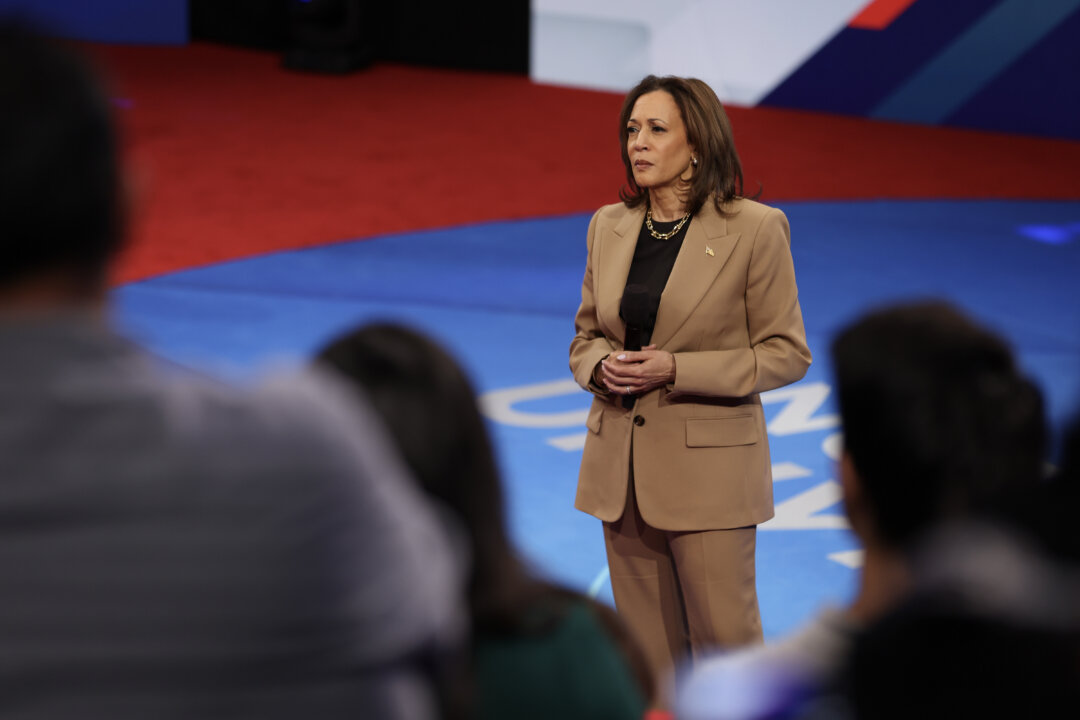Asked to name three of her rival’s virtues, the vice president says, ‘I think Donald Trump loves his family, and I think that is very important.’
Vice President Kamala Harris participated in Univision’s presidential town hall in Las Vegas on Oct. 10 as part of her campaign’s final push to win over undecided Latino voters, who could hold significant sway in the upcoming election.
Enrique Acevedo, a Mexico-based anchor, moderated the town hall, which featured nearly 100 Latino voters from across the nation.
Harris fielded questions about healthcare policy, immigration, inflation, abortion rights, and the federal government’s response to recent hurricanes. She defended her record on immigration and repeated her support for “Dreamers,” stating that they should be on a path to earn their citizenship.
She also talked about the border bill negotiated in the Senate early this year, blaming former President Donald Trump, her election rival, for derailing it.
One notable moment occurred when a voter asked the Democratic candidate to name three virtues of Trump.
“I think Donald Trump loves his family, and I think that is very important,” Harris responded.
She said, however, that she didn’t know the Republican nominee well enough. “I don’t have much more to offer you,” Harris said.
In another notable moment, an undecided voter expressed his frustration over the way President Joe Biden quit the race and questioned how Harris became the party’s nominee.
Harris thanked the voter for being “candid” and praised Biden for making a decision she believed history would recognize as “one of the most courageous that a president could make.”
The vice president added that she had been “partners” with Biden for the past four years and was “honored to have earned the Democratic nomination.” She also mentioned that numerous individuals and organizations, including some Republicans, had endorsed her.
After the event, Harris flew to Phoenix for a rally in another battleground state.
Latino voters have historically favored Democrats and played an important role in key swing states. In Arizona and Nevada, Latinos account for 25 percent and 22 percent of eligible voters, respectively.
A majority of Latino voters (59 percent) backed Joe Biden in 2020, according to Pew Research Center.
A recent survey, however, shows that the Republican nominee is gaining support among this key Democratic voter group and narrowing the gap with Harris.
According to the latest Economist/YouGov poll conducted in October, 48 percent of Hispanic voters expressed support for Harris, while 43 percent favored Trump. This marks a significant decline in Harris’s support from the September 15–17 poll by the same organization, which recorded her support at 60 percent and Trump’s at 32 percent.
Low support for Harris is most pronounced among young Latino men, as highlighted by a new USA TODAY/Suffolk University poll.
In Arizona, for example, 51 percent of Latino men ages 18–34 expressed support for Trump, while 39 percent in the same age group supported Harris. A similar trend was observed in Nevada, where 53 percent of Latino men ages 18–34 favored Trump, compared with 40 percent for Harris.
Univision announced that it would host a town hall with Trump in Miami on Oct. 16. The Trump campaign reportedly preferred Miami, home to a large population of Cuban Americans.
The Spanish language network earlier announced that it would not fact-check candidates on stage during the town halls.
Harris will also participate in CNN’s live town hall on Oct. 23 in Pennsylvania, according to the network.
Nationwide, Harris and Trump are currently in a tight race, with 49 percent indicating they would vote for the vice president and 47.2 percent expressing support for the former president, according to the Real Clear Politics polling average.
An estimated 36.2 million Latinos will be eligible to vote this year, a new record, according to a study by the Pew Research Center.
Since the 2020 presidential election, the number of Latino eligible voters has grown by 12 percent, the second-fastest rate of any major racial or ethnic group in the U.S. electorate, the study showed. The Asian eligible voter population grew by 15 percent.
Latinos are likely to account for nearly 15 percent of all eligible voters nationwide in November 2024, playing a critical role in determining who will be president.

